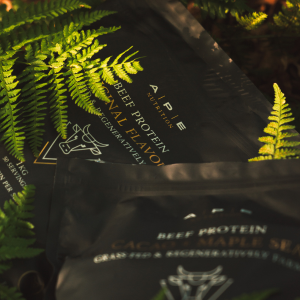As the temperature and hours of sunlight begin to drop, this signals a time to change not only how we live, but what we eat. Each season, our needs on every level shift; the amount of sleep we need, the way the body utilises energy and burns fuel, the type of exercise we most benefit from, and the specific nutrients that most support us all change, so it’s time for us to change too.
Throughout the hot and sunny Summer months, nutrients that protected the skin and kept us hydrated were key. As we wind our way into Autumn, immunity, metabolism, digestion and harnessing the power of recovery and deep sleep become vital. Autumn offers us a valuable moment to re-set and re-centre ourselves as we switch from the high energy of Summer to the depths of Winter. Research shows the body may also switch from a more insulin-sensitive state during Summer, to a more insulin-resistant state in Winter, indicating that we may benefit from less sugar and more satiating fats and proteins during this time.
The most important factor overall when it comes to Autumnal health is to focus on eating and living seasonally; connecting with the world around us and consuming the foods that come from that land, so we can head into the darker, colder months fully supported.
Read on for the nutrients your body needs to thrive this Autumn:
Vitamin D
This nutrient is absolutely vital for immune health, as well as bone health, hormone balance, blood sugar balance and so much more. Ideally, we’d spend the entire Summer outdoors soaking up the UBV rays that help stimulate vitamin D production in the skin (the same beneficial UVB rays that traditional sun cream blocks…). Vitamin D is stored in the liver and adipose tissue (body fat) for several months, and when we need it, the body releases this stored vitamin D into the bloodstream. We don’t tend to completely run out of vitamin D, but levels definitely plummet by late Winter if we don’t keep them topped up. So, as well as charging yourself up with sun during the Summer, aim to get plenty of vitamin D through foods.
Best sources: Oily fish like sardines and mackerel, egg yolks, beef liver, mushrooms (particularly shiitake)
Vitamin C
Most associated with immunity, vitamin C is also beneficial for supporting collagen production, so if you want to get the most from our grass-fed collagen, consider increasing your vitamin C intake alongside it. As we move from Summer to Autumn, less sunlight, more time indoors, and changes in the gut microbiome can all influence immune health. Vitamin C is important for supporting immunity, although factors such as stress, inadequate intake, over-cooking vitamin C rich foods, gut issues, smoking and alcohol can all mean it gets depleted quickly, leaving us less protected from illnesses. If you want to support hormone health, it’s also useful to know that vitamin C is vital for progesterone production and sperm health, so consume it regularly.
Best sources: Blackcurrants, broccoli, brussels sprouts, kale
Iron
Less time spent in bright sunshine can leave us feeling fatigued and low. This is where iron comes in. Iron is crucial for supporting oxygenation and energy levels, as well as a balanced mood and good quality sleep. Especially if you find yourself feeling tired as Autumn draws in, consider whether you’re consuming enough iron-rich foods in your diet. The very best and most easily absorbed form of iron is heme iron, which you’ll find in animal foods like organ meats and red meat. Non-heme plant sources such as spinach and beans simply don’t provide nearly as much iron – and plant foods like beans and grains can actually hinder absorption – so focus on animal sources, especially if your levels are low.
Best sources: Beef spleen, beef liver, red meat, oysters
Omega 3s
Especially if your mood levels tend to drop when Autumn arrives, it’s important to include plenty of omega 3s in your diet to support brain health, mood, plus skin and joints, which can become stiff in cold weather for many people. EPA and DHA - which are especially helpful for brain function and mood regulation - are found in fish and our Celtic oysters, and can also help prevent symptoms of depression. Omega 3s also have anti-inflammatory properties that help regulate immune responses and balance the immune system.
Best sources: Oily fish like sardines and mackerel, Celtic oysters, walnuts, flax seeds
Vitamin B6
This nutrient is a key co-factor for serotonin, dopamine and melatonin, which are all essential, especially in Autumn. It’s natural to feel a little more tired and low with less exposure to bright sunlight in Autumn, however if your body is over-stressed and depleted in nutrients, you’re far more likely to suffer. Keeping levels of B6 high naturally with foods is important in helping your body make hormones like serotonin and dopamine that aid in happiness, relaxation, motivation and drive. Vitamin B6 is also needed for the production of white blood cells to support immunity, and melatonin, vital for sleep.
Best sources: Beef Liver, Beef Organs, tuna, salmon, chicken, turkey
Vitamin B12
If you’ve ever felt fatigued or low, chances are you’ve looked up (or been told) it’s linked to low vitamin B12. Especially if your diet doesn’t contain many animal sources, B12 levels can run low, potentially leading to fatigue, irritability, shortness of breath, and nerve issues like numbness and tingling. Much like iron, B12 is involved in the health of red blood cells, as well as nerve impulses and metabolism. To keep energy and mood levels balanced through Autumn, try to include plenty of B12 daily, especially if you’re pregnant or breastfeeding, when nutrient demand for B12 is much higher.
Best sources: Beef liver, Beef Organs, red meat, salmon, trout, oysters
Vitamin A
Have you heard the notion that carrots can help you see in the dark? Well, it turns out there’s some truth to this, but the vitamin A from beef liver is way more likely to support your vision than carrots… Retinol – specifically ‘retinal’, which is a pre-formed and active form of vitamin A found in Beef Liver, is important for maintaining healthy vision and supporting the retina’s rod cells, which primarily function in low-light conditions. Whilst the beta-carotene from carrots can be converted into retinal, the best way to obtain vitamin A for eye health and seeing better in the dark is by getting it from animal sources. Vitamin A is also necessary for a strong immune system throughout Autumn.
Best sources: Beef Liver, Beef Organs, egg yolks, cod liver oil, salmon
Magnesium
As ‘nature’s tranquiliser’, magnesium supports relaxation and sleep, but it’s also vital for energy production, heart health, bone mineral density, and over 300 biochemical reactions in the body. You may have heard that most of us are low in this vital nutrient, and much of that is down to soil depletion. Intensive farming practices that strip the soil of nutrients have depleted soil mineral content by over 30% during the last 60 years, meaning crops are at least 30% less rich in minerals like magnesium than they used to be. By supporting regenerative farming practices, we’re working directly with farmers to help replenish soil nutrients and create a more sustainable future for real food.
After a long Summer of more activity, we tend to naturally crave time to rest and recuperate in Autumn, and consuming more magnesium can help us do that. Taking Epsom Salts baths and using topical magnesium oil is also a useful way to provide the body with magnesium.
Best sources: Spinach, kale, chard, pumpkin (especially the seeds)
Fibre
Whilst not necessarily a nutrient, fibre is key when it comes to supporting digestion, which can slow down in Autumn, leading to bloating and feelings of heaviness. Fibre is also essential for helping maintain hormone balance, as staying ‘regular’ helps us eliminate toxins and excess levels of hormones such as estrogen from the system. Consuming plenty of fibre is a great way to support balanced blood sugar levels too, especially when consuming carbohydrates. The fibre helps slow down the release of sugar into the bloodstream, preventing a blood sugar spike and crash.
Best sources: Well-cooked root veg like swede, parsnip, sweet potato, celeriac
Tryptophan
One of the nine essential amino acids, tryptophan is the precursor to neurotransmitters like serotonin and melatonin, both vital during Autumn. Serotonin helps support a balanced, calm mood, and melatonin is vital for sleep. Tryptophan can be especially helpful for anyone dealing with low mood levels or ‘SAD’ in Autumn by supporting serotonin production and regulating appetite, as well as boosting cognitive function and focus. Melatonin – derived from tryptophan and serotonin – isn’t just important for sleep; it's one of the most important chemicals we produce that aids immunity, brain health, healthy ageing and hormonal balance. As well as consuming foods high in tryptophan, you can also support your serotonin production by looking after your gut health, since around 95% of serotonin is made in the gut, and boost your melatonin production by embracing those darker nights, since melatonin is primarily stimulated by darkness.
Best sources: Turkey, chicken, beef, eggs, milk
Enjoy!
Written by Emma Newlyn
Emma is a health and nutrition coach who specialises in blending ancient wisdom and modern health techniques to help people feel well inside and out. Emma brings over 12 years of experience in the health industry to APE Nutrition, and specialises in answering your nutrition and supplement questions, and creating articles on many different areas of wellbeing.






